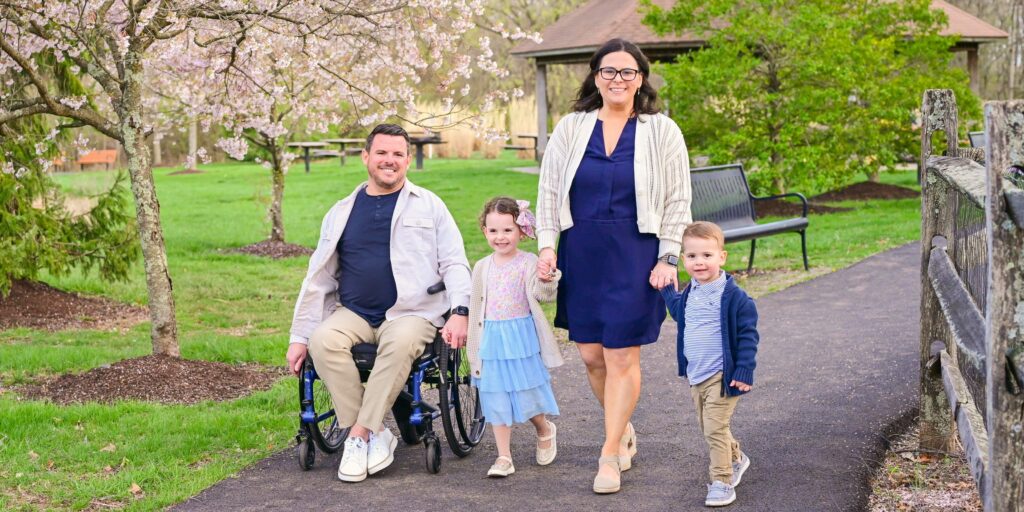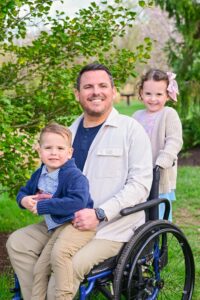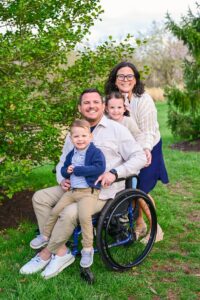
MDA Ambassador Guest Blog: Parenting, LGMD, and Choosing Joy
By Chris Carroll | Monday, July 21, 2025
5 Second Summary
MDA Ambassadors play an essential role in furthering MDA’s mission while representing and empowering the neuromuscular disease community. Quest Ambassador Guest Blog series provides a platform to share their personal stories, perspectives, and experience.
Chris Carroll is 41 years old and lives with his wife Joy and two children Jordyn (4) and Brogan (who will be 3 soon). Chris works for Mullen Coughlin LLC. A data privacy law firm in Devon Pa. In his free time, Chris loves going to Phillies games with his family and going out to eat… and cleaning!
Being a parent to two children is a full-time job. Being a working parent makes it a daily balancing act. Add muscular dystrophy into the mix and life becomes a journey, filled with unique challenges, quiet victories, and deep love.
I was diagnosed with limb-girdle muscular dystrophy (LGMD) when I was 13 years old. I grew up in a large, loving family full of children and for as long as I can remember, I wanted to be a father. Becoming one has been one of the most fulfilling experiences of my life. What I didn’t expect was how fatherhood would unlock a strength I never knew I had.
I’m not sharing this for sympathy or to be seen as a superhero. I want people to see my real story as a full-time working father who lives with a disability and uses a manual wheelchair. The story that includes both exhaustion and joy, limitations and adaptations, guilt and grace.
The physical realities
Let’s be honest; parenting is physical. Picking up toys, chasing toddlers, folding laundry, driving kids everywhere – it’s constant. Add working a full-time job, and it can become overwhelming. With LGMD, that weight feels heavier.

Chris, Joy, Jordy and Brogan
Simple things like getting out of bed, showering, getting dressed, and driving to work take more time and energy than most people imagine. Some days, it feels like I’ve climbed a mountain before 9 a.m. Thankfully, I work for an employer who gets it. I can work from home several days a week and I have coworkers who are always willing to help. That kind of support means everything.
But getting to this point was not easy.
When I was a teenager, my first job was at a local supermarket. On the first day, I was assigned to clean and lift heavy deli equipment, something that I physically was not capable of doing. Instead of speaking up, I just left. I was too embarrassed to ask for help or request an accommodation.
That moment stayed with me. I promised myself I would never let my condition stand in the way of my career. But even now, it’s not always easy. When I applied for my current job, I was hesitant to ask for accommodations because I did not want to seem incapable. After I was hired and I met with human resources, I realized that they were not only willing to agree with my requests but also offered additional accommodations beyond what I initially requested. That experience reminded me: advocating for yourself isn’t a weakness; it’s a strength.
Teamwork at home
At home, “teamwork makes the dream work” is more than just a saying. My wife, Joy, and I operate as a team. We’ve built a rhythm where we anticipate each other’s needs and support one another. On hard days, especially when the kids are pushing our limits, I sometimes feel helpless. Watching her do the things I physically cannot do can be tough. But instead of feeling inadequate, we’ve built a partnership grounded in trust and communication.
Facing differences
One of my biggest fears before becoming a parent was how my kids would react when they realized I was different. I worried about them being teased or having to explain my condition to their friends. I feared they’d see me as “less than” because I couldn’t run or play like other dads.

Hanging out on Daddy’s chair
But here’s what I’ve learned: they don’t measure me by what I can’t do. They watch how I respond to setbacks. They see how I keep going, even when it’s hard. Together, we’re learning patience, compassion, and adaptability. Through them and through Joy, I’ve learned not to hide my condition, but to talk about it, teach others, and answer questions with honesty.
This has helped in my personal life and has also helped with my success in my career.
The small wins
Living with LGMD has taught me to celebrate the small victories that others might overlook. Some days, just getting to work feels like a major win. Other days, it’s rolling my kids into school and watching their faces light up. Whether I’m clocking in at my job or showing up for my kids, those moments remind me that my value isn’t measured by what LGMD tries to take away—it’s found in being present, and most of all, in being their dad.

The ones who give me strength!
Choosing Joy
And I do choose Joy—in every sense of the word.
This journey isn’t easy. There are hard days when the weight of it all threatens to overwhelm me. But there are also moments of laughter, bedtime stories, and simple, quiet joy. Those moments keep me going.
To every working parent living with a neuromuscular disease: I see you. Your resilience matters even when it doesn’t feel heroic. Your path might look different, but it’s no less valid. You are adapting, evolving, and showing up.
Next Steps and Useful Resources
- For more information about the signs and symptoms of Limb Girdle muscular dystrophy (LGMD) , as well an overview of diagnosis and treatment concerns, an in-depth review can be found here.
- To learn more about MDA’s Parenting Information, visit here.
- To learn more about MDA’s Mental Health Hub, visit here.
- Read MDA Ambassador Cassidy Niles Guest Blog on The Joy of Motherhood.
- Read MDA Ambassador Matt Curcio’s Guest Blog on Fatherhood and Adaptive Parenting.
- Listen to a Quest Podcast conversation with Megan DeJarnett, a speaker and inclusion advocate living with spinal muscular atrophy (SMA), about why she wrote her first children’s book, “No Such Thing as Normal.”
- MDA’s Resource Center provides support, guidance, and resources for patients and families. Contact the MDA Resource Center at 1-833-ASK-MDA1 or ResourceCenter@mdausa.org
- Stay up-to-date on Quest content! Subscribe to Quest Magazine and Newsletter.
Disclaimer: No content on this site should ever be used as a substitute for direct medical advice from your doctor or other qualified clinician.




